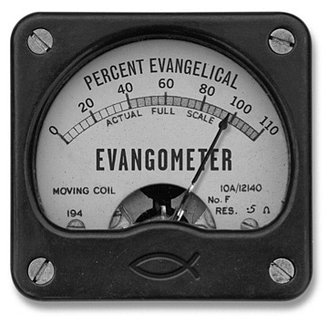
There is no doubt that the term is applied to Christians however the dominant view today seems to be that an evangelical is a politically conservative Christian and in particular a Protestant, politically conservative Christian. There is also the view that a politically liberal Christian is somehow not evangelical.
Merriam-Webster Dictionary - evangelical
1: of, relating to, or being in agreement with the Christian gospel especially as it is presented in the four Gospels
2: protestant
3: emphasizing salvation by faith in the atoning death of Jesus Christ through personal conversion, the authority of Scripture, and the importance of preaching as contrasted with ritual
4 a capitalized : of or relating to the Evangelical Church in Germany
b often capitalized : of, adhering to, or marked by fundamentalism : fundamentalist
c often capitalized : low church
5: marked by militant or crusading zeal
National Association of Evangelicals (NAE) (the NAE is is a fellowship of member denominations, churches, organizations, and individuals. Its stated goal is to honor God by connecting and representing evangelicals in the United States. Today it works in four main areas: Church & Faith Partners, Government Relations, Chaplains Commission, and World Relief. The NAE is a member of the World Evangelical Alliance. The NAE represents more than 45,000 local churches from nearly 40 different denominations, in addition to nondenominational churches. The mission statement of the association is "to honor God by connecting and representing evangelical Christians.)
The term “evangelical” comes from the Greek word euangelion, meaning “the good news” or the “gospel.” Thus, the evangelical faith focuses on the “good news” of salvation brought to sinners by Jesus Christ.
According to the Institute for the Study of American Evangelicals at Wheaton College, Martin Luther first used the Latinized form of the word evangelium to describe the non-Catholic churches formed during the Protestant Reformation in the 1500s.
The term took hold more than a century later during the Great Awakening, a series of revivals in Britain and the American colonies. Because of the influence of Jonathan Edwards and George Whitfield, evangelicalism became a synonym for revivalism. By the early 1800s, it was “by far the dominant expression of Christianity” in the United States.
The term really went mainstream when Jimmy Carter became the nominee of the Democratic Party for, and was elected President of the United States. He was the first U.S. President to call himself a “born again” evangelical Christian. Not to be left out, conservative evangelicals who who differed from President Carter created and mobilized under new organizations like the Christian Coalition and the Moral Majority. These politically conservative groups were labeled the religious right. The pollsters then lumped religious right with evangelicalism.
Because of this the term evangelical Christian became is equivalent to “right-wing, fundamentalist Republican.” For others, "evangelical Christian" is a title used to differentiate between Catholic and Protestant Christians, with Protestant being evangelical. Others use the term to indicate adherence to the fundamental doctrines of Christianity like the inspiration, inerrancy, and authority of Scripture, the Trinity, the deity of Christ, and salvation by grace through faith alone.
These definitions span a range of denominations, churches, and organizations, there is no single membership statement to delineate identity. To the pollster, it is a sociological term. To the pastor, it is a denominational or doctrinal term. And to the politician, it is a synonym for a white Christian Republican.
The most widely accepted definition of evangelical is probably the one put forward by historian David Bebbington in 1989. It’s called the “Bebbington quadrilateral” because it identifies evangelicals as Christians who share four main qualities:
- Conversionism: the belief that lives need to be transformed through a “born-again” experience and a life long process of following Jesus
- Activism: the expression and demonstration of the gospel in missionary and social reform efforts
- Biblicism: a high regard for and obedience to the Bible as the ultimate authority
- Crucicentrism: a stress on the sacrifice of Jesus Christ on the cross as making possible the redemption of humanity
The NAE/LifeWay Research method includes four statements to which a person must agree to be categorized as evangelical:
- The Bible is the highest authority for what I believe.
- It is very important for me personally to encourage non-Christians to trust Jesus Christ as their Savior.
- Jesus Christ’s death on the cross is the only sacrifice that could remove the penalty of my sin.
- Only those who trust in Jesus Christ alone as their Savior receive God’s free gift of eternal salvation.

These things define evangelicals, not political, social or cultural trends. In fact, many evangelicals rarely use the term “evangelical” to describe themselves. They focus on the convictions of the triune God, the Bible, faith, Jesus, salvation, evangelism and discipleship.
Because political polls often focus on white evangelical voters, white evangelicals that means they end up being portrayed as the face of evangelicalism, period. You never hear them talk about African American evangelicals. However consider this there are two evangelicals, as defined by NAE, one African American, one white who sit next to each other every Sunday. They could have the same religious beliefs, but they're likely to have vastly different political beliefs. The African American is s more likely to vote Democratic, while the white one will lean Republican.
I consider myself an evangelical. I'm not white or politically conservative. I’m more moderate in my political views. I typically vote for Democrats and not for Republicans or other politically conservative candidates.
I have been born again, I am saved and know, without a doubt, that I’m saved. I live my life according to the principles of the Bible. I write blog that disagree at times with the views of, who some call, liberal Christians, and at other times with who, same call, conservative, “Word of Faith” or “Prosperity Gospel” Christians.
In reality, all Christians should be evangelical Christians. The Bible is consistently instructing us to be witnesses of the good news
Matthew 28:18-20 (HCSB)18 Then Jesus came near and said to them, “All authority has been given to Me in heaven and on earth.19 Go, therefore, and make disciples of all nations, baptizing them in the name of the Father and of the Son and of the Holy Spirit,20 teaching them to observe everything I have commanded you. And remember, I am with you always, to the end of the age.”
1 Peter 3:13-15 (HCSB)13 And who will harm you if you are deeply committed to what is good?14 But even if you should suffer for righteousness, you are blessed. Do not fear what they fear or be disturbed,15 but honor the Messiah as Lord in your hearts. Always be ready to give a defense to anyone who asks you for a reason for the hope that is in you.
Holding to the fundamentals of the Bible will result in a certain worldview and, yes, political belief. However, there is nothing about being an evangelical that demands a certain political party or affiliation.
An evangelical Christian is called to share the good news, to preach God's Word, and to set an example of purity and integrity. That is an evangelical!

 RSS Feed
RSS Feed